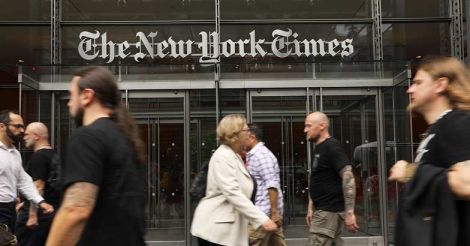India’s decision to demonetize high-value banknotes had triggered mixed reactions from global media and financial organizations. Prime Minister Modi’s move had attracted both praise and criticism at the same time. Some had also changed their views later.
Global Times
The Chinese state media termed demonetization a “very bold” decision. “We cannot imagine what would happen in China if the country bans its 50 and 100 yuan notes,” it wrote in an editorial.
Modi had to keep the plan confidential to prevent a leak of the information jeopardizing implementation of the reform, the paper wrote in an editorial.
Modi is in a dilemma as the reform aims to render the black money useless, but the process goes against the governance principle of winning support of the public before initiating a new policy, it said.
More than 90% of transactions in India happen in cash and junking 85% of the currency in circulation brings a lot of trouble to people's daily life, it wrote.
While also highlighting criticism from various fronts against demonetization, the report quoted former prime minister Manmohan Singh who called the move an “organized loot”.
Irrespective of the success or failure of the initiative, China will draw lessons from its impact on corruption, the paper said.
Later, when India reported a slowdown in GDP growth, the newspaper cited demonetization as a reason.
British Broadcasting Corporation
Modi’s decision to withdraw high-value notes to stamp out corruption wasn’t well-planned, the BBC opined.
While criticizing the move, the British media house said it was “mired in confusion”.
It also expressed concern over the impact of demonetization on corruption in rural India and wondered about the possibility of the emergence of a black market for the demonetized notes.
Arab Media
Media in the Arabian Gulf published detailed reports about Indian housewives who were hurt by the note-ban.
Now, Indian husbands have realized how much black money their wives have stashed away, said one report.
Women, who get cash from their husbands to run the household, often hide tiny amounts in kitchen jars, tucked under mattresses, or stashed away in the dark corners of closets, making those their bank, it said.
Even working women have such savings, it added.
The Independent
Singapore’s leading newspaper, The Independent, lauded the demonetization decision. Prime Minister Modi has done a “Lee Kuan Yew to stamp out corruption in India”, the newspaper wrote.
The late Lee Kuan Yew, Singapore’s first Prime Minister who governed the city-state for three decades, had taken tough steps to fight corruption between 1986 and 1994.
Forbes
The American business magazine called demonetization as a 'clever plan' and expressed optimism about its success.
The Washington Post
Modi has long made fighting black money a priority, as the country moves to legitimize its shadow economy, end the culture of corruption and attract foreign investment, the paper said.
The Sydney Morning Herald
Modi is attempting to fulfill his election promise of curbing tax evasion and recovering illegal income through the move, the Australian newspaper said.
This unprecedented step by the Indian prime minister follows a similar decision made by the European Central Bank to discontinue the 500-euro notes, it said.
The New York Times
Financial analysts hailed demonetization as a bold and potentially transformational decision for India, the New York Times said.
It is also a high-stakes experiment; no other Indian leader has reduced the supply of cash in the country so drastically or so abruptly, it wrote.
The Wall Street Journal
If the reforms work, in theory, it could widen the government’s tax base, the American business paper said.
But the Journal also warned about the possibility of a slowdown hitting the economy.
International Monetary Fund
Demonetization sucked in cash like a “vacuum cleaner” and it has adversely affected consumption, the IMF said.
India should consider the formation of an independent finance panel to ensure strong growth. Countries with such bodies have achieved high growth rate, it said.
Though demonetization has created some difficulties, it helped tackle the parallel economy and tax avoidance as well as boost digital transactions, it said later.
The Indian economy is strong. It will quickly overcome the short-term slowdown.
Morgan Stanley
The global financial services firm has predicted India to become the fastest growing economy in the next 10 years. Digitization, favorable demographics, globalization and economic reforms will boost India’s surge, it said.
World Bank
Expansion of the tax base following demonetization will lead to sustainable growth in the government’s revenue, the multilateral body said in a report.
Tax revenue for 2016–2017 has increased as a result of demonetization and the tax amnesty scheme. The budget had targeted a 10.8% expansion, but it has increased 11.3%, the World Bank said.
Asian Development Bank
India will achieve growth of 7.4% this fiscal year and 7.6% in the next, the ADB said.
Introduction of goods and services tax and the new bankruptcy code will improve the business environment.
Impact of demonetization lasted only for a short period. A surge is what is visible for the near term, it said.
Organization for Economic Co-operation and Development
Though demonetization affected consumption temporarily, it will help strengthen India’s economy in the long-term, according to an OECD survey.
The move will bring sustainable improvement to the economy by boosting cash-less transactions and strengthening the banking system, the survey report said.
Click to explore more in our exclusive Demonetization Special

























 New York Times called the move a 'high-stakes experiment', saying that no other Indian leader has reduced the supply of cash in the country so drastically or so abruptly: Getty
New York Times called the move a 'high-stakes experiment', saying that no other Indian leader has reduced the supply of cash in the country so drastically or so abruptly: Getty